悪い円安とは?
「悪い円安」とは、円の価値が他の通貨(主に米ドルやユーロなど)に対して下落し、経済に悪影響を及ぼす状況を指します。通常、円安には輸出産業に有利な側面があるため一概に悪いとは言えませんが、特定の状況では「悪い円安」として国民生活や経済全体にデメリットをもたらすことがあります。
円安とは
「円安」とは、円の価値が下がり、他の通貨に対して円を多く支払わなければならなくなる状況を指します。たとえば、1ドル=100円だった為替レートが1ドル=150円に変わると、円の価値が相対的に下がり、円安になります。
「悪い円安」の原因
円安が「悪い」とされる場合の原因はいくつかあります:
原油価格の上昇や資源価格の高騰
日本はエネルギー資源をほぼ輸入に依存しているため、円安になると石油や天然ガスの輸入コストが増加します。これは輸送コストや生産コストに波及し、最終的に物価が上昇する要因になります。
金融政策の違い
日本銀行(中央銀行)が低金利政策を続けている一方、他国、特にアメリカが利上げを行うと、投資家は高金利の通貨に資金を移動させます。この結果、円が売られ、円安が進行します。
輸入物価の上昇
円安が進むと、輸入品の価格が上昇します。エネルギーや食料品、工業部品などの輸入コストが高くなることで、生活必需品の価格が上がり、一般消費者に負担がかかります。
「悪い円安」の影響
物価上昇と生活費の増加 輸入品の価格が上がると、食品、ガソリン、電気料金などの日常的な生活費が上昇します。特に、エネルギーや原材料の価格が上がることで、消費者は生活のあらゆる面で負担増を感じるようになります。
企業のコスト負担増
多くの日本企業は、製造業を中心に原材料や部品を海外から調達しています。円安によって輸入コストが上昇することで、企業の利益が圧迫され、価格転嫁を余儀なくされることもあります。これが結果として消費者物価の上昇につながります。
実質賃金の低下
物価の上昇に対して賃金が追いつかない場合、実質賃金(生活費を考慮に入れた賃金の価値)は下がります。これにより、消費者の購買力が低下し、消費活動が鈍ることが懸念されます。
経常赤字
円安は本来、輸出産業を支えるものであり、海外での商品販売が有利になるため、輸出企業にとってはプラスの要素です。しかし、日本の輸出産業は製造拠点を海外に移転しているケースが多く、円安による輸出増加の恩恵が限定的になっているため、輸入コストが輸出の増加を上回る「経常赤字」につながることがあります。
対策や議論
政府や日本銀行は円安が経済に悪影響を及ぼす場合、政策対応を検討しますが、そのアプローチは議論の的となります。
金融政策の調整
日本銀行は円安を抑制するために、金利を引き上げるなどの金融政策を検討することがありますが、金利を上げすぎると国内景気が冷え込むリスクがあります。
輸入依存の低減
円安の影響を軽減するためには、国内の生産能力を高めることで輸入依存度を下げることも一つの解決策です。エネルギーの自給率を高めたり、再生可能エネルギーの利用を推進することで、エネルギーコストの増加に対応できる可能性があります。
「悪い円安」は、輸入コストの増加や物価上昇を通じて、経済に負の影響を与える現象です。特にエネルギーや食品価格の上昇が、国民生活を圧迫し、企業活動にも負担をかけます。円安そのものは必ずしも悪いものではありませんが、輸出の恩恵が少ない現状では、「悪い円安」の影響を強く感じることがあります。このため、適切な経済政策や構造的な改善が求められます。
Bad yen depreciation” refers to a situation in which the value of the yen depreciates against other currencies (mainly the U.S. dollar and the euro), adversely affecting the economy. Although the yen’s depreciation is usually not generally considered a bad thing, as it favors export industries, under certain circumstances, a “bad yen depreciation” can have a detrimental effect on people’s lives and the economy as a whole.
What is a Weak Yen?
A “weak yen” refers to a situation in which the value of the yen declines and the yen has to be paid more against other currencies. For example, if the exchange rate changes from 100 yen to the dollar to 150 yen to the dollar, the relative value of the yen decreases and the yen weakens.Causes of “Bad Yen Weakness
There are several causes of a “bad” yen depreciation:Rising oil and resource prices
Since Japan is almost entirely dependent on imports for its energy resources, a weak yen increases the cost of importing oil and natural gas. This will spill over into transportation and production costs, ultimately causing prices to rise.Differences in Monetary Policy
When the Bank of Japan (central bank) continues its low interest rate policy while other countries, especially the U.S., raise interest rates, investors move their money into currencies with higher interest rates. As a result, the yen sells off and depreciates.Rise in import prices
As the yen weakens, prices of imported goods rise. Higher import costs for energy, food, industrial parts, etc., raise the prices of daily necessities and place a burden on the average consumer.Effects of a “Bad Yen”
Higher Prices and Increased Living Expenses As prices of imported goods rise, daily living expenses such as food, gasoline, and electricity costs rise. In particular, consumers will feel an increased burden in all aspects of their lives as energy and raw material prices rise.Increased Cost Burden on Businesses
Many Japanese companies, especially in the manufacturing industry, procure raw materials and parts from overseas. As import costs rise due to a weaker yen, corporate profits are squeezed and they may be forced to pass on the higher costs to consumers in the form of higher prices. This results in higher consumer prices.Decline in real wages
When wages do not keep pace with the rise in prices, real wages (the value of wages after taking cost of living into account) will fall. This will reduce the purchasing power of consumers and slow down their consumption activities.Current account deficit
A weaker yen is inherently supportive of export industries and is a positive factor for exporters, as it makes it more advantageous to sell products overseas. However, in many cases, Japan’s export industries have relocated their manufacturing bases overseas, limiting the benefits of increased exports due to a weaker yen, which can lead to a “current account deficit” where import costs exceed export growth.Countermeasures and Discussion
The government and the Bank of Japan consider policy responses when the yen’s depreciation adversely affects the economy, but their approach is controversial.Adjusting Monetary Policy
The Bank may consider raising interest rates or other monetary policy measures to curb the yen’s depreciation, but raising interest rates too much risks cooling the domestic economy.Reducing Import Dependence
One solution to mitigate the impact of a weak yen is to reduce dependence on imports by increasing domestic production capacity. Increasing energy self-sufficiency and promoting the use of renewable energy sources may help address rising energy costs.A “bad yen” is a phenomenon that negatively impacts the economy through increased import costs and higher prices. In particular, increases in energy and food prices put pressure on people’s lives and strain corporate activities. Although a weak yen itself is not necessarily a bad thing, the effects of a “bad yen” can be strongly felt in the current situation where the benefits of exports are minimal. Appropriate economic policies and structural improvements are therefore required.
AIが描いた「悪い円安」
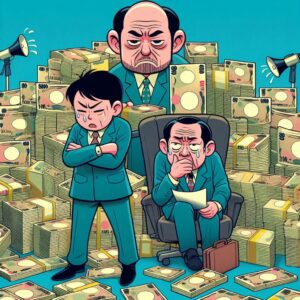
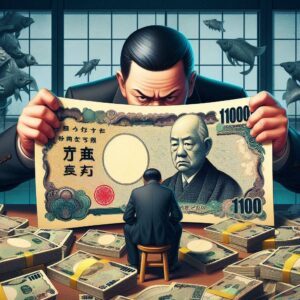
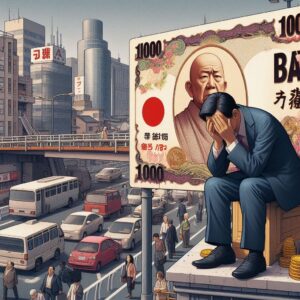

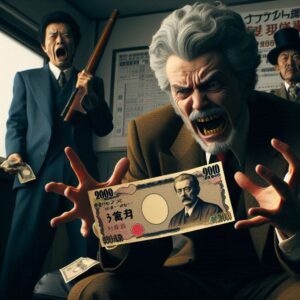

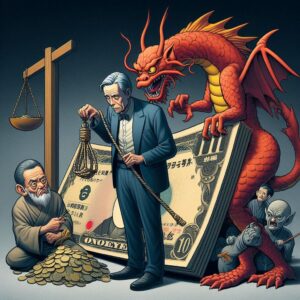
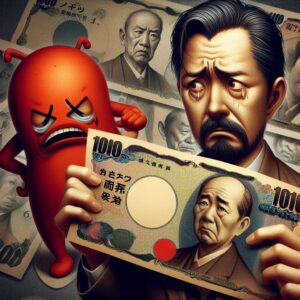
















コメント